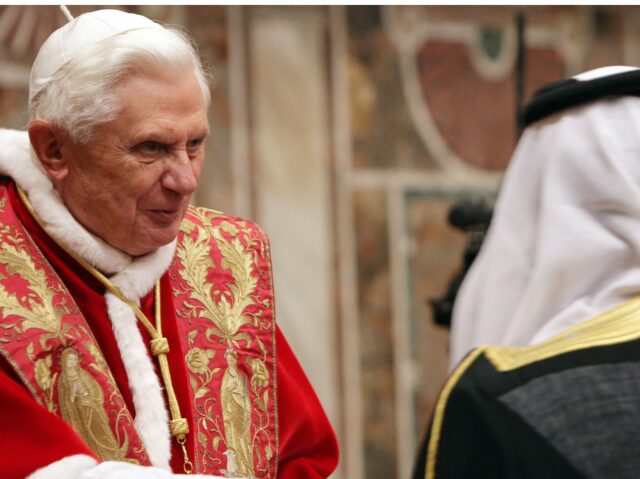Pope Benedict XVI, laid to rest at the Vatican on Thursday, stirred controversy early in his pontificate by quoting a Byzantine emperor critical of Islam.
A scholarly theologian who passed away aged 95 at the close of 2022, Benedict provoked suspicion if not hostility from much of the media establishment when he became pontiff in 2005, due to the widespread perception that he was a conservative — or at least a liberal turned conservative.
He was first pounced on in a sustained manner just a year into his pontificate when he gave his infamous Regendsburg address on September 12th 2006 — a day after the fifth anniversary of the September 11th radical Islamic terror attacks on the United States — in which he quoted from a dialogue between “an educated Persian” and Emperor Manuel II Paleologus.
Paleologus was the ruler of what historians now call the Byzantine Empire but what the Byzantines themselves insisted was the Roman Empire, though it no longer included Rome and was not in communion with the Roman Catholic Church.
“Show me just what Mohammed brought that was new, and there you will find things only evil and inhuman, such as his command to spread by the sword the faith he preached,” Benedict quoted the emperor as saying, acknowledging that the Qur’an at one point says there should be no compulsion in religion but further noting that “[a]ccording to some of the experts, this is probably one of the suras of the early period, when Mohammed was still powerless and under threat… naturally the emperor also knew the instructions, developed later and recorded in the Qur’an, concerning holy war.”
Benedict further quoted the emperor as saying that God “is not pleased by blood”, and that “[w]hoever would lead someone to faith needs the ability to speak well and to reason properly… To convince a reasonable soul, one does not need a strong arm, or weapons of any kind, or any other means of threatening a person with death”.
Though he said the emperor’s words were delivered with “a brusqueness that we find unacceptable” in his long and schlorarly address, Benedict was heavily criticised in the Islamic world and in the press, with Pakistan’s parliament passing a unanimous resolution condemning him and demanding an apology, Morocco’s autocratic king recalling his ambassador to the Vatican, and “Palestinians wielding guns and firebombs attack[ing] churches of various Christian denominations” in the West Bank and Gaza, according to National Public Radio (NPR).
Britain’s leftist Guardian, meanwhile, reported that the Muslim Council of Britain declared the “Byzantine emperor’s views about Islam were ill-informed and, frankly, bigoted,” and that a “religious leader such as the Pope [should] act and speak with responsibility and repudiate the Byzantine emperor’s views in the interests of truth and harmonious relations between the followers of Islam and Catholicism.”
Emperor Manuel II is believed to have made his remarks between 1394 and 1402, when Bayezid I, the Muslim ruler of the Ottoman Empire, was besieging his capital, Constantinople, in an effort to starve it into submission.
The city survived this siege, but was conquered by the Ottomans during the reign of Manuel’s son, Constantine XI, in 1453, with many of its inhabitants murdered or enslaved, countless Christian icons and relics destroyed or plundered, and its ancient churches desecrated, including the Church of the Holy Wisdom or Hagia Sophia — then the greatest cathedral in the world, now forcibly converted into a mosque.
Benedict, for his part, expressed great regret at the offence he had caused, and the Vatican’s online copy of his address contains a footnote lamenting that the quotation “has unfortunately been taken as an expression of my personal position, thus arousing understandable indignation.”
“I hope that the reader of my text can see immediately that this sentence does not express my personal view of the Qur’an, for which I have the respect due to the holy book of a great religion,” the pontiff added.

COMMENTS
Please let us know if you're having issues with commenting.